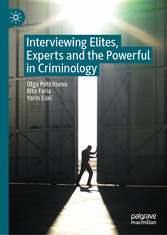Suche
Lesesoftware
Info / Kontakt

Interviewing Elites, Experts and the Powerful in Criminology
von: Olga Petintseva, Rita Faria, Yarin Eski
Palgrave Pivot, 2019
ISBN: 9783030330002 , 174 Seiten
Format: PDF, Online Lesen
Kopierschutz: Wasserzeichen




Preis: 53,49 EUR
eBook anfordern 
Preface
5
Contents
8
List of Tables
9
List of Text Boxes
10
1 Introduction
11
1.1 Introduction
12
References
16
2 Interviewing ‘the Powerful’ in Crime and Crime Control
18
2.1 Introduction
18
2.2 Conceptual Issues: Who Are the ‘Powerful’, ‘Elites’ and ‘Experts’?
19
2.2.1 ‘Experts’
19
2.2.2 ‘Elites’
20
2.2.3 ‘The Powerful’ (In Crime and Crime Control)
24
2.3 Particularities of Qualitative Interviews with the Powerful
27
2.4 Why Interview the Powerful?
31
2.5 Core Readings
33
References
33
3 Interview Models and Researcher’s Self-Positioning
37
3.1 Introduction
37
3.2 Informal and Ethnographic Interviews
42
3.3 Doxastic Interviews
46
3.4 Looking Glass: Researcher as a Peer
47
3.5 Active Interviewing
52
3.5.1 Epistemic Interviewing
54
3.5.2 ‘Light’ Socratic Dialogues as a Variation of Epistemic Interviewing
56
3.5.2.1 Shifts and Porous Distinctions Between Epistemic and Doxastic Modes
58
3.5.2.2 Types of Topics to Discuss During (Light) Socratic Interviews
59
3.5.2.3 Attentiveness to the Research Context and Interaction
60
3.5.2.4 Interviewer as Critic
61
3.6 Core Readings
62
References
62
4 Their Reign, Their Game? Accessing the Powerful
67
4.1 Introduction
68
4.2 Sampling
69
4.3 Gaining Access
75
4.4 Maintaining Access
90
4.5 Core Readings
95
References
96
5 Prepare, Prepare, Prepare
99
5.1 Introduction
99
5.2 Gaining Insights in the Setting and Its Ongoing Debates
101
5.3 Constructing a Topic List
104
5.4 Probing and Elicitation
110
5.5 Core Readings
111
References
111
6 Conducting the Interview
113
6.1 Introduction
114
6.2 Gaining Trust and Building Rapport
115
6.3 Dealing with Questions and Assumptions About Your Knowledge and Views
121
6.4 Ethics During the Interview Interaction
123
6.5 Language, Jargon, Body Language, Attitude
127
6.6 Getting into Sensitive Topics and Past Corporate Answers
131
6.7 Physical Setting
134
6.7.1 The Interview Venue
134
6.7.2 Interviewing in the Online and Off-Line World
139
6.8 Core Readings
141
References
141
7 Making Sense of the Data
145
7.1 Introduction
145
7.2 Transcribing and Coding
146
7.3 Researcher as a Situated Actor
150
7.4 Assessing Data Quality
151
7.4.1 Authenticity
152
7.4.2 Transparency
155
7.4.3 Consistency/Coherence
156
7.4.4 Triangulation
157
7.5 Ethics in Analysis and Reporting
161
7.6 Leaving the Field and Getting Back to Participants
165
7.7 Presenting Your Findings
167
7.8 Core Readings
168
References
169
Index
173




